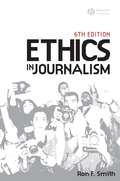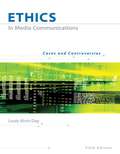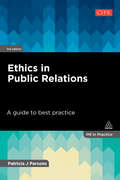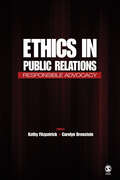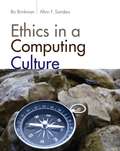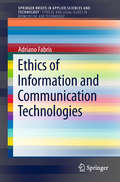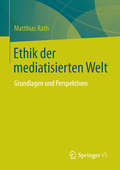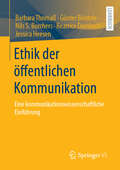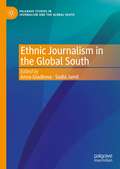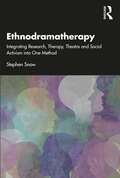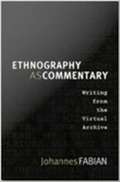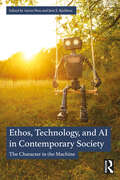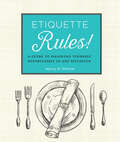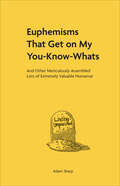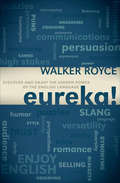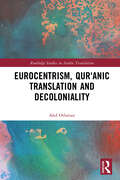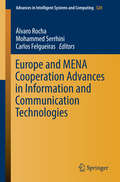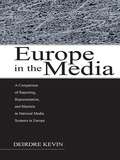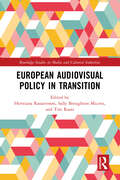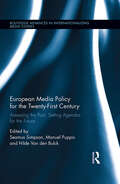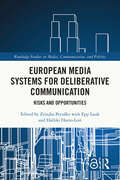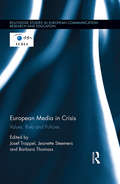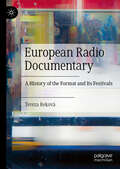- Table View
- List View
Ethics in Journalism
by Ron SmithThe reputation of journalists is continually being questioned. Nearly every public opinion poll shows that people have lost respect for journalists and lost faith in the news media. In this fully updated and expanded 6th edition of Ethics in Journalism, author Ron F. Smith provides a highly readable introduction to journalism ethics, and offers solutions for the many ethical dilemmas facing journalists today. Utilizes dozens of new case studies, mostly taken from everyday experiences of reporters at both large and smaller newspapers and TV stations Explores the practical ethical issues involved in developing sources, coming to terms with objectivity, and bringing compassion to the pressures of journalism Considers the impact of blogs and the internet on traditional values of journalism Compares journalistic practices across different free societies
Ethics in Media Communications: Cases and Controversies
by Louis DayHave you ever wondered exactly what ethical standards exist in the media? ETHICS IN MEDIA COMMUNICATIONS: CASES AND CONTROVERSIES explains it all and shows you that there's a lot more to the story behind the scenes. Whether the issue is censorship, privacy, or accuracy, the media is governed by ethical norms that you need to know. And because it's packed with case studies and review tools, this media ethics textbook is the one that will help out on the test as well.
Ethics in Public Relations: A Guide to Best Practice
by Patricia J ParsonsEthical practice in any professional discipline is guided by age-old philosophical perspectives, but its modern parameters are continually evolving. Ongoing developments in technology, social media and social contexts mean that public relations and its practices are constantly changing, and so do the ethical questions faced by practitioners in the field. Ethical questions and dilemmas are inherent to public relations, and ensuring that practitioners operate ethically is fundamental to the professionalism and credibility of the field. Engaging and accessible, Ethics in Public Relations offers a lively exploration of the key ethical concerns present in the public relations world today by way of practical tips and guidance to support those in PR and corporate communications. Written by a leading academic in the field, this fully updated third edition of Ethics in Public Relations includes an entirely new chapter on the uses of ethics in social media, covering topical issues such as blogger engagement and the relationship between employee social media activity and organizational reputation.
Ethics in Public Relations: Responsible Advocacy
by Kathy Fitzpatrick & Carolyn Bronstein"This is an intelligent book about serious issues in public relations: accountability, responsibility, transparency, loyalty, truthtelling, and fairness. It should be required reading in boardrooms, in PR classrooms, and at the Pentagon." - Jay Black, Editor, Journal of Mass Media Ethics "Ethics in Public Relations fills an important need at a time when the credibility of public relations (and some public relations practitioners and public relations firms) is under attack. In a manner that is never preachy or dogmatic, Fitzpatrick and Bronstein have put together a series of essays that have application across the public relations spectrum. They are sure to be informative and instructive both to long-time professionals and candidates for entry-level positions." - Harold Burson, Founding Chairman, Burson Marstellar "This book is both highly readable and long overdue. Fitzpatrick and Bronstein have produced a thoughtful, thorough, and very practical look at the ethical dimensions of public relations, not just in theory, but in everyday practice. The essays are sharp, witty, on-point and highly pragmatic. Their examples are relevant, their anecdotes purposeful. Given the state of the profession these days, it′s difficult to see how students of public relations could call themselves current without first reading this smart collection of essays." - James S. O′Rourke IV, Professor and Director, The Eugene D. Fanning Center for Business Communication, University of Notre Dame "Fitzpatrick and Bronstein have for every public relations professional established a foundation to practice advocacy ethically. Practice settings may change, but Fitzpatrick and Bronstein demonstrate that the individual professional has an ongoing ethical imperative to advocate responsibly. Fitzpatrick′s discussion of the PRSA Code of Ethics concept of advocacy (which she helped draft) breaks new and helpful ground, bringing clarity and substance to this crucial ingredient of most public relations practice." - James E. Lukaszewski, Chairman and President, The Lukaszewski Group Inc. Ethics in Public Relations: Responsible Advocacy is the first book to identify universal principles of responsible advocacy in public relations. In this engaging book, editors Kathy Fitzpatrick and Carolyn Bronstein bring together prominent authorities in the field to address theoretic and practical issues that illustrate the broad scope and complexity of responsible advocacy in 21st-century public relations. The collection explores such matters as the fragile line between ethical and legal public relations practices, ethical challenges in building relationships with increasingly diverse publics, the requirements of ethical advocacy online, ethical accountability in organizational settings, the special ethical obligations of nonprofit groups, and ethical mandates in cross-border public relations.
Ethics in a Computing Culture
by Bo Brinkman Alton F. SandersETHICS IN A COMPUTING CULTURE introduces key ideas in moral theory and professionalism to explore the hottest topics in computer ethics. With a unique blend of theory, application, and critical thinking exercises, each chapter underscores the interdisciplinary links between computing and diverse areas of study. Abundant multicultural cases are presented throughout to highlight contrasts and conflicts in ethical perspectives across the globe. ETHICS IN A COMPUTING CULTURE encourages students to continually read, reflect and write to hone sharp critical thinking skills. Students learn that that computing is not a purely technical discipline but one with moral and social implications that affect everyday life.
Ethics in intercultural and international Communication (Routledge Communication Series)
by Fred L. CasmirThere has been an increased interest in both intercultural and international communication, as well as ethical aspects of such interactions. In spite of this, there are no books which address this specific subject matter beyond limited surveys of different types or forms of ethics, or attempted comparisons between various ethical or value systems. This book intends to engage readers rather than trying to teach them about ethics or how to be ethical. It is questionable that ethics can be taught as academic subject matter, or that such instructions will result in meaningful applications in the daily lives of students. By considering specific challenges affecting ethical behavior in various intercultural and international interactions, and by suggesting interactive, dialogic behavioral models as well as examples, the authors seek to create an atmosphere of involvement and discussion which will lead researchers to consider the ethics undergirding their own lives, as well as any resulting ethical or unethical practices.
Ethics of Information and Communication Technologies (SpringerBriefs in Applied Sciences and Technology)
by Adriano FabrisThis book discusses key ethical and deontological problems concerning the use of the most common information and communication devices. It focuses on the challenges of the new environments we now find ourselves in thanks to these technologies, and the issues arising from the newly established relationship between the virtual sphere and the real world. Each aspect is analysed by starting from a very specific example or a case study presenting a dilemma that can only be resolved by making a reasoned ethical choice. Rather than thematically addressing only one of the many aspects mentioned above (for example, computer ethics or social network ethics), the book presents a comprehensive introduction to, and a co-ordinated overview of, the various deontological and ethical issues regarding the spread of the most common information and communication technologies.
Ethik der mediatisierten Welt: Grundlagen und Perspektiven
by Matthias RathDer Band erweitert die Medienethik über Medieninhalte und Medienpraxis hinaus zur „Ethik der mediatisierten Welt“. Er fußt dabei einerseits auf der Einsicht in die grundsätzliche Medialität des Menschen sowie die daraus folgende Prägung seiner gesellschaftlichen Realität und überbrückt andererseits die Kluft zwischen normativer Ethik und deskriptiven Kommunikations- und Medienwissenschaften. Eine Ethik der mediatisierten Welt muss dabei nicht nur die eigenen philosophischen Wurzeln bedenken, sondern die medienethischen Grundbegriffe auch interdisziplinär beherrschen. Sie wird daher als integrative Disziplin zwischen Philosophie und Kommunikations- und Medienwissenschaften verstanden.
Ethik der öffentlichen Kommunikation: Eine kommunikationswissenschaftliche Einführung
by Beatrice Dernbach Günter Bentele Jessica Heesen Barbara Thomaß Nils S. BorchersDas Lehrbuch führt auf kommunikationswissenschaftlicher Grundlage in die Theorie, Methodik und das Leistungsvermögen der Ethik öffentlicher Kommunikation ein. Es wendet die grundlegenden Erkenntnisse ethischer Reflexion auf relevante Berufsfelder der öffentlichen Kommunikation an (Journalismus, Public Relations, Werbung), berücksichtigt aber auch die nicht-professionelle öffentliche Kommunikation im Digitalen. Es liefert Orientierungswissen für künftige (und gegenwärtige) Angehörige dieser Berufsfelder und derer, die an der gesellschaftlichen Kommunikation teilnehmen. Es orientiert sich an der Berufspraxis ebenso wie an begründeten normativen Erfordernissen.
Ethnic Journalism in the Global South (Palgrave Studies in Journalism and the Global South)
by Anna Gladkova Sadia JamilThis book focuses on ethnic journalism in the Global South, approaching it from two angles: as a professional area and as a social mission. The book discusses journalistic practices and ethnic media in the Global South, managerial and editorial strategies of ethnic media outlets, their content specifics, target audience, distribution channels, main challenges and trends of development in the digital age.
Ethnodramatherapy: Integrating Research, Therapy, Theatre and Social Activism into One Method
by Stephen SnowEthnodramatherapy explores the integration of the performance ethnography method, known as ethnodrama, with the principles and practices of drama therapy to establish a sound theoretical formulation for ethnodramatherapy, and considers its use as art, as therapy, as research and as a vehicle for social justice. The book begins by defining ethnodramatherapy – an original synthesis created by the author through deep study and practice of Mienczakowski’s enthnodrama, combined with 35 years of his own practice and research in drama therapy, creative arts therapies and therapeutic theatre. The book describes the origins of ethnodramatherapy, along with its evolution and method. It then delves into applications of the practice highlighted by five case studies with different audiences in different settings. Subjects include adults with developmental disabilities, female adolescents in youth protection, caregivers for loved ones with mental illnesses and Chinese students exploring controversial issues of oppression in China. Complex ethical issues are reviewed and suggestions are made on how to deal with some of the challenging ethical situations that are likely to arise in the ethnodramatherapy process. What emerges is a powerful tool that harnesses theatrical art, ethnographic research and the clinical techniques of drama therapy to create a potential for emancipatory experience for both performers and audiences. This exciting and dynamic synthesis of drama therapy, performance ethnography, theatrical art and social activism will be of interest to the whole community of theatre practitioners and scholars who use theatre to effect individual and social change, including the disciplines of applied theatre, theatre education, experimental theatre, performance studies, and, of course, drama therapy, psychodrama and the other creative arts therapies.
Ethnography as Commentary: Writing from the Virtual Archive
by Johannes FabianThe Internet allows ethnographers to deposit the textual materials on which they base their writing in virtual archives. Electronically archived fieldwork documents can be accessed at any time by the writer, his or her readers, and the people studied. Johannes Fabian, a leading theorist of anthropological practice, argues that virtual archives have the potential to shift the emphasis in ethnographic writing from the monograph to commentary. In this insightful study, he returns to the recording of a conversation he had with a ritual healer in the Congolese town of Lubumbashi more than three decades ago. Fabian's transcript and translation of the exchange have been deposited on a website (Language and Popular Culture in Africa), and in Ethnography as Commentary he provides a model of writing in the presence of a virtual archive. In his commentary, Fabian reconstructs his meeting with the healer Kahenga Mukonkwa Michel, in which the two discussed the ritual that Kahenga performed to protect Fabian's home from burglary. Fabian reflects on the expectations and terminology that shape his description of Kahenga's ritual and meditates on how ethnographic texts are made, considering the settings, the participants, the technologies, and the linguistic medium that influence the transcription and translation of a recording and thus fashion ethnographic knowledge. Turning more directly to Kahenga--as a practitioner, a person, and an ethnographic subject--and to the questions posed to him, Fabian reconsiders questions of ethnic identity, politics, and religion. While Fabian hopes that emerging anthropologists will share their fieldwork through virtual archives, he does not suggest that traditional ethnography will disappear. It will become part of a broader project facilitated by new media.
Ethos, Technology, and AI in Contemporary Society: The Character in the Machine
by Jens E. Kjeldsen Aaron HessBringing together expert rhetorical theorists and technologists, this book explores our current understanding of, and attitudes toward, ethos, credibility, and trust in today’s changing technological landscape.Recent advancements in technology, including the development of digital technologies, the growth of algorithmic machine learning and artifical intelligence, and the circulation of disinformation in social media, necessitate a reevaluation of ethos. To explore the rhetorical concept of ethos, which is the perceived character of a speaker, contributors theorize how ethos is enabled, constrained, and constituted through new communication technologies. In this edited collection, chapters address key philosophical questions concerning the rhetorical capacities of modern communicating machines such as ChatGPT, Midjourney, or other digital platforms. Through case studies, new theorizing, and critical inquiry, contributors contemplate the changing relationship between humans and technology in rhetoric and ethos, revealing contemporary tensions and insecurities regarding issues including authenticity and authorship.This book will be of interest to students and scholars in the fields of Rhetoric, Communication Studies, Technology Studies, Digital Humanities, and Cultural Studies.
Etiquette Rules!: A Guide to Handling Yourself Effortlessly in Any Situation
by Nancy R. MitchelA comprehensive field guide to modern manners, including social skills, phones & social media, the workplace, dining, weddings, and more.Good manners are the hallmark of a well-rounded person, and are a character trait that can benefit one socially and professionally. However, a lot has changed since the first etiquette guides were published almost a century ago, with modern etiquette encompassing so much more than simply being able to identify between a chowder and consommé spoon.To step in and guide readers is Nancy R. Mitchell, who, for more than thirty-five years, has been an etiquette consultant and trainer for numerous institutions and corporations. From revealing the secrets behind successful networking and job interviews, to decoding proper dining habits, to wedding decorum, Etiquette Rules! succinctly gives readers everything they need to successfully maneuver with manners in today’s world.Praise for Etiquette Rules!“An excellent general primer for a young woman entering the workplace.” —The New York Times“In a world where reading news headlines would have you believe it has gone to hell in a hand-basket, it is nice to see someone making the effort to uphold some common civility and manners which, though they might be updated now for same-sex weddings, work cubicles or food trucks, are never out of style.” —DearAuthor.com
Euphemisms That Get on My You-Know-Whats: And Other Meticulously Assembled Lists of Extremely Valuable Nonsense
by Adam SharpEver wondered what the Mandarin word for platypus translates to? Probably not, but it&’s &“duck mouth beast.&” And there&’s more where that came from, thanks to Adam Sharp&’s Euphemisms That Get on My You-Know-Whats, a collection of fascinating, hilarious, and brilliantly odd lists.This book covers just about everything you never knew you didn&’t know, from the noises that animals make around the world to titles of movies that sound dirty but aren&’t—and much more. Whether you revel in trivia, desire more creative ways to curse your foes, or simply enjoy the structure of a good list, you&’ll love the weird genius of Euphemisms That Get on My You-Know-Whats.
Eureka!: Discover and Enjoy the Hidden Power of the English Language
by Walker RoyceLearn the ins and outs of effective written and oral communication through a collection of trivia, puzzles, lists, anecdotes, and practical lessons. Eureka! illuminates the oddities, the amusement, and the communication power to be found in the English language. Instead of highlighting all the mechanics and hairball rules of English, Walker Royce leads you through an educational and entertaining workout of your English knowledge and skills. Provocative insights into high-stakes forms of communication—speaking, coaching, selling, interviewing, and even romance—are mixed with English language trivia, humorous anecdotes, and unique puzzles. His inspiring perspective will transform you into a better listener, writer, speaker, and teammate, and it will stimulate some deeper self-observation—a catalyst for improving your own communications proficiency.
Eurocentrism, Qurʾanic Translation and Decoloniality (Routledge Studies in Arabic Translation)
by Ahd OthmanEurocentrism, Qurʾanic Translation and Decoloniality contributes to the understanding of Eurocentrism in Translation Studies and engages with the concept through the lens of scholarship on Arabic and Qurʾan translation.This book calls for a deeper consideration of Eurocentrism as essential for several debates in the discipline, including its scientific character and future development. It claims that the angle of Arabic and Qurʾan translation is a valuable – and nearly unexploited – area where tensions in translation scholarship can play out in revealing ways. The book also draws connections between Eurocentrism, Qurʾan translation and decolonial thought in order to highlight ‘decoloniality’ as a useful framework for imagining a post-Eurocentric discipline.The book will appeal to scholars and postgraduate students and researchers interested in Translation Studies, particularly within the areas of Arabic, Qurʾanic, Islamic and religious translation.
Europawahlkampf 2019: Zur Rolle der Medien
by Christina Holtz-BachaDer Band versammelt Beiträge, die Befunde aus Untersuchungen zum Europawahlkampf 2019 in und mit den traditionellen und den neuen Medien präsentieren. In Anbetracht des Erstarkens rechtspopulistischer Parteien und des Nationalismus galt die Europawahl 2019 als Schicksalswahl für Europa, was für den Wahlkampf ein besonderes Engagement auf Seiten der Politik wie auch der Medien erwarten ließ. Gegenüber dem Europawahlkampf 2014 kam zudem den sozialen Netzwerken gesteigerte Bedeutung zu, die den politischen Akteuren ein zusätzliches Kampagneninstrument bieten, aber auch den Wahlkampf abseits der öffentlichen Beobachtung ermöglichen.
Europe and MENA Cooperation Advances in Information and Communication Technologies
by Álvaro Rocha Mohammed Serrhini Carlos FelgueirasThis book contains a selection of articles from The Europe, Middle East and North Africa Conference on Technology and Security to Support Learning 2016 (EMENA-TSSL'16), held between the 3th and 5th of October at Saidia, Oujda, Morocco. EMENA-TSSL'16 is a global forum for researchers and practitioners to present and discuss recent results and innovations, current trends, professional experiences and challenges in Information & Communication Technologies, and Security to support Learning. The main topics covered are: A) Online Education; B) Emerging Technologies in Education; C) Artificial Intelligence in Education; D) Gamification and Serious games; E) Network & Web Technologies Applications; F) Online experimentation and Virtual Laboratories; G) Multimedia Systems and Applications; H) Security and Privacy; I) Multimedia, Computer Vision and Image Processing; J) Cloud, Big Data Analytics and Applications; K) Human-Computer Interaction; L) Software Systems, Architectures, Applications and Tools; M) Online Languages and Natural Language Processing N) E-content Development, Assessment and Plagiarism; O) Secure E-Learning Development and Auditing; P) Internet of Things and Wireless Sensor Networks.
Europe in the Media: A Comparison of Reporting, Representation, and Rhetoric in National Media Systems in Europe (European Institute for the Media Series)
by Deirdre KevinEurope in the Media draws together the results of several research projects that examined media coverage of European political and cultural affairs and media representations of Europe. The book attempts to outline some of the important debates regarding European integration and to describe the media landscape in which these debates are informed, reflected, and facilitated. The research presented sought to answer several questions, namely the role of the media in the democratic process at the European level and the extent to which the media contributes to and reflects the process of European integration. The book provides a wide scope of comparative analysis, allowing for an extremely interesting overview of the way that national media systems in France, Germany, Ireland, Italy, the Netherlands, Poland, Spain, Sweden, and the United Kingdom approach the issue of European integration. Based on the news output of over 50 media outlets in eight countries, this book contains the original data gathered by experts during two 1-week monitoring periods, as well as data that was collected and coded by experts with reference to the programming of more than 12 major broadcasters in six countries. This volume addresses debates and analysis from the fields of political science in relation to the process of European integration, EU policymaking and public participation and opinion-formation. It also outlines relevant media theory regarding the relationships between the media and democracy, and the media and identity formation. In this way, the book provides a valuable link between these two separate fields of investigation in an area that is of increasing interest to academics, students, politicians, and journalists.
European Audiovisual Policy in Transition (Routledge Studies in Media and Cultural Industries)
by Heritiana Ranaivoson Sally Broughton Micova Tim RaatsThis book describes and critically addresses the innovations and shifts made in the revision of the Audiovisual Media Services Directive (AVMSD) adopted by the European Parliament and Council in 2018. Reflecting on European Union regulation and policy practice in all its Member States, the book’s unique approach places in-depth case study topics against the broader theoretical background. Taking a Europe-wide angle, an international team of authors focuses on key aspects of the AVMSD: the expansion of its scope to include video-sharing-platforms such as YouTube; the update of the rules for commercial communications; the first attempt for harmonized, minimal requirements at EU level regarding transparency of media ownership; new rules to ensure that video-on-demand services offer, invest in, and prioritise European content; the obligation on television distributors and smart TV manufacturers to pass on broadcasters’ signal without any interference, alteration or modification; and, the formalisation and consolidation of new forms of collaboration among national regulatory authorities. This thorough analysis of the cornerstone of European media policy makes this edited collection a crucial reference for scholars and students of media and cultural industries, media law and policy, European and EU media policy, and technology studies.
European Media Policy for the Twenty-First Century: Assessing the Past, Setting Agendas for the Future (Routledge Advances in Internationalizing Media Studies)
by Seamus Simpson Manuel Puppis Hilde van den BulckMedia policy issues sit at the heart of the structure and functioning of media systems in Europe and beyond. This book brings together the work of a range of leading media policy scholars to provide inroads to a better understanding of how effective media policies can be developed to ensure a healthy communication sector that contributes to the wellbeing of individual citizens, as well as a more democratic society. Faced with a general atmosphere of disillusionment in the European project, one of the core questions tackled by the volume’s contributors is: what scope is there for European media policy that can exist beyond the national level? Uniquely, the volume’s chapters are structured around four key policy themes: media convergence; the continued role and position of public regulatory intervention in media policy; policy issues arising from the development of new electronic communication network environments; and lessons for European media policy from cases beyond the EU. In its chapters, the volume provides enriched understandings of the role and significance of policy actors, institutions, structures, instruments and processes in communication and media policy.
European Media Systems for Deliberative Communication: Risks and Opportunities (Routledge Studies in Media, Communication, and Politics)
by Epp Lauk Zrinjka Peruško Halliki Harro-LoitEuropean Media Systems for Deliberative Communication explores how four dimensions of national media systems – the legal framework for freedom of expression and information, media accountability, journalism and audience media usage and competencies – contribute to or are detrimental to the success of deliberative communication.Drawing on a study of 14 European countries and their media systems, the volume provides comparative and individual perspectives to examine the social consequences of various types of media systems. By using fsQCA (fuzzy set qualitative comparative analysis), the authors relate deliberative communication to the legal framework for freedom of expression and freedom of information, media accountability, journalism and media usage and media competencies. The book shows how different combinations of conditions and contexts figure as risks or opportunities that are detrimental to, or supportive of, deliberative communication, measured with an original index on a European level.This book will interest scholars and students in communication studies, political communication, media and society, media sociology, global media studies, European Studies and journalism.
European Media in Crisis: Values, Risks and Policies (Routledge Studies in European Communication Research and Education)
by Josef Trappel Jeanette Steemers Barbara ThomassWhen the financial markets collapsed in 2008, the media industry was affected by a major slump in advertising revenues, and a formerly highly successful business model fell into a state of decay. This economic crisis has threatened core social values of contemporary democracies, such as freedom, diversity and equality. Taking a normative and policy perspective, this book discusses threats and opportunities for the media industry in Europe: What are the implications of the crisis for professional journalism, the media industry, and the process of political communication? Can non- state and non-market actors profit from the crisis? And what are media policy answers at the national and European level?
European Radio Documentary: A History of the Format and Its Festivals
by Tereza RekováThis book studies the history and significance of radio documentaries in Europe, and the institutions that are specialized on this genre. Focused on the 50-year history of the International Feature Conference (an annual gathering of radio documentarians from around the world), the book discusses the Prix Europa, Prix Italia, the Third Coast International Audio Festival, and the HearSay Audio Arts Festival. The book tells the story of people who chose sound as their lifestyle and who spread their passion worldwide.
